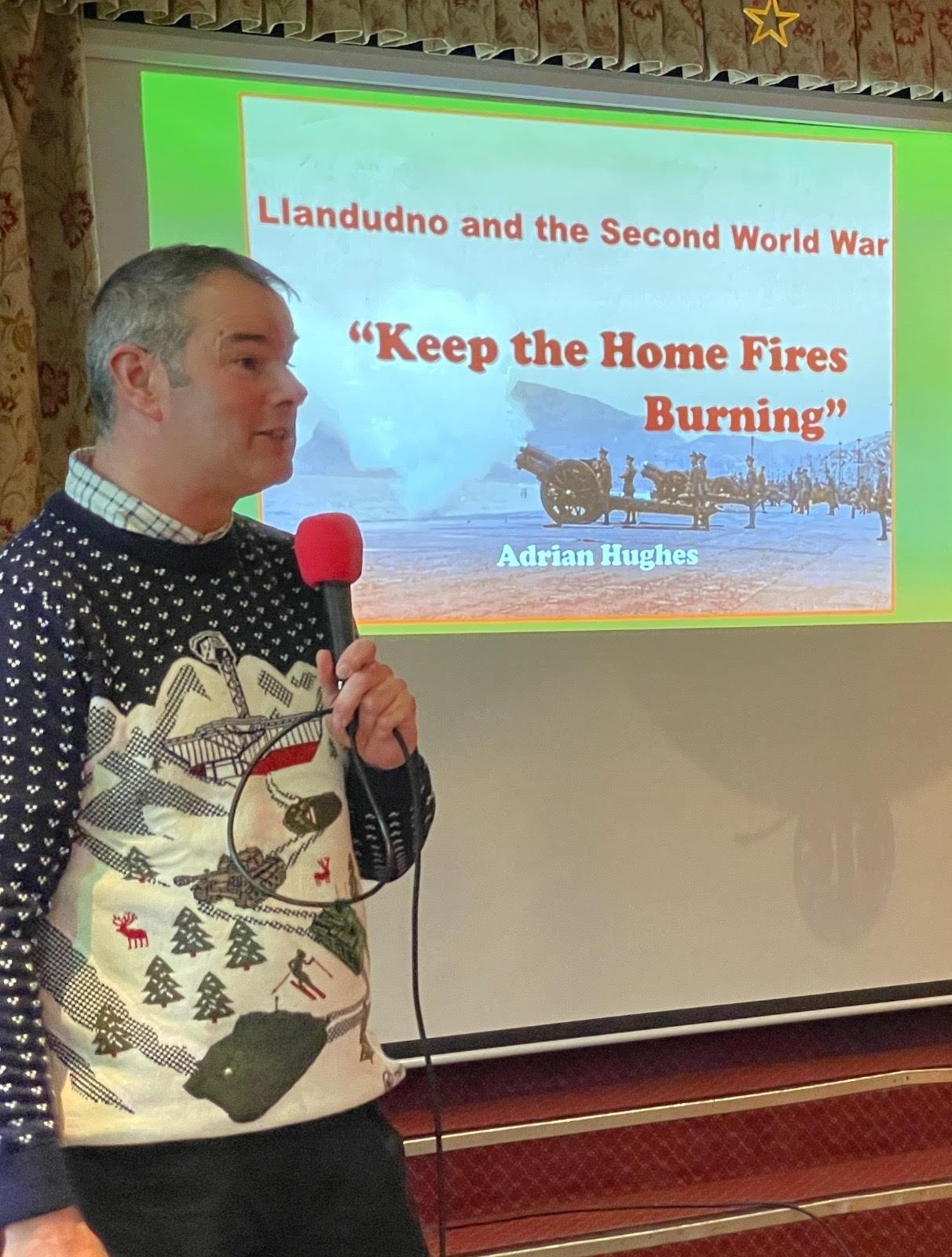
5 minute read
Keep the Home Fires Burning
Denbigh and District Probus Club Members Keep the Home Fires Burning!!
Members and guests of the Denbigh and District Probus Club enjoyed a wonderful Christmas meal in December at the Oriel Hotel, St Asaph followed by a talk titled Keep the Home Fires Burning from Adrian Hughes who owns and runs the Home Front Museum in Llandudno.
Adrian’s interest in WW2 information and items stemmed from an incendiary bomb that dropped on his grandparents’ drive during WW2. They used it as a doorstop in their house and Adrian was always intrigued with it as a child and the history of the bomb and the wars.
Following a gap year in Australia, he studied forestry in Aberdeen University and shortly after, opened the museum. He has written 2 books: Llandudno’s Military Heritage and Conwy’s Military Heritage and a 3rd, Quirky Llandudno is in progress with publication due in mid-2025.
From Llandudno, he has been on a quest to find the last resting places of all of the 340 men commemorated on the town’s war memorial from both world wars. Of the 340 names on the memorial, 218 died during the First World War and 122 died during the Second World War. He has visited numerous countries as part of this work. Adrian’s research has led him to meet many families of the fallen and conversely, families have approached him for information about their relatives. On such occasions, Adrian has been able to give them photographs of loved ones that they had not previously seen. He is also a volunteer for Commonwealth War Graves Commission.
He started the town’s Home Front Museum on New Street, Llandudno in 2000 and has been collecting Second World War memorabilia since he was eight years old. The Home Front Museum contains his personal collection of Second World War Artifacts gathered over 40 years and housed in Llandudno’s wartime auxiliary fire station.
The museum is open from late March to October every year and gives visitors an opportunity to reminisce, discover how the war was won on the ‘kitchen front,’ see gas masks, ration books and hundreds of other items on display, find out about Dig for Victory, the Home Guard and evacuation. www.homefrontmuseum.co.uk
Adrian explained to members and guests how Llandudno was chosen for evacuated people.
He took everyone back to WW1 which broke out in 1914, the peak of the holiday season in Llandudno. This was a disaster in terms of business for hotel and guesthouse owners because of the loss of income as holidaymakers left for home quickly after and bookings were cancelled.
In September 1914 following discussion and negotiation, 7000 troops including Royal Welsh Fusiliers, were billeted in Llandudno and guesthouse owners and hoteliers were paid by the government. By the summer of 1915, the summer holiday makers started to return to Llandudno as the threat of conflict and bombing in the area was minimal.
WW2 was declared on 3rd September 1939 by Neville Chamberlain. It was decided to move civil servants and many vital departments from London because of the risk of enemy attacks and bombing and Llandudno was chosen as an ideal town for some of the relocations as well as other North Wales towns. Only 3 bombs dropped in Llandudno during WW2 – one in the sea, one on a beach and the third on Nant Y Gamar.
The Ministry of Works and Buildings moved to the Westminster Hotel in Rhyl, the Ministry of Food was in Colwyn Bay and the Inland Revenue Department in Llandudno located in the Imperial Hotel (it became the headquarters of the service in the UK).
The BBC Variety department was sent to Bristol then Bangor ending up in Llandudno, based in the Grand Theatre (now the Broadway Boulevard).
Jim Callaghan (Prime Minister 1976-1979) was the assistant secretary for pensions and in charge of billeting civil servants. Some 4000 arrived in the area bringing their families with them.
Adrian explained how numerous areas were used to support the war effort including the Royal Artillery School using the Great Orme with men billeted in the Gogarth Abbey Hotel and the Summit Hotel was requisitioned by the Airforce.
He revealed where some of the top secret agents were hidden, where prisoners of war were held, where the Americans were and how popular they became due to their access to food and other goods like tinned peaches, chewing gum, candy and nylons. How there were respite hotels for the Women’s Land Army, information about the Local Defence Volunteers, Home Guard activities, the War Savings Centre, ration books and free Cod Liver Oil and Orange juice for children, ending the excellent illustrated talk with the VE and VJ day parties.
New members are always warmly welcomed to the Denbigh and District Probus Club meetings.
For further information have a look at the club web site denbighprobus.com or contact stevetootell@gmail.com











